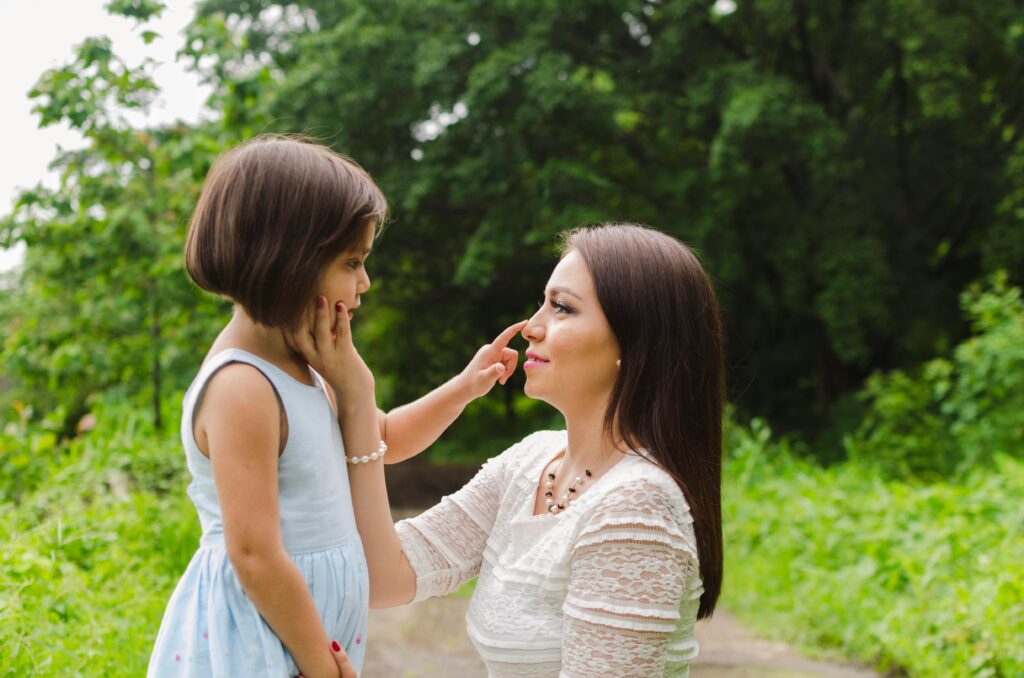Between the spit-up, the meltdowns, and the never-ending to-do list, it’s easy to get down on ourselves. That nagging inner critic whispering “You’re such a bad parent!” can be particularly damaging.
Parenting often begins with the relationship we have with ourselves. The way we talk to ourselves, our self-talk, plays a crucial role in shaping our perceptions, decisions, and ultimately, our ability to be patient and balanced parents. Negative self-talk can be a challenge for parents, affecting not our own mental health but also the quality of our relationships with our children.
This guide is here to equip you with the tools to transform that negative self-talk and silence your inner critic. Let’s create a more positive and empowering inner dialogue, because a happy parent makes for a happier home (and a whole lot less stress!).
The Power of Self-Talk in Parenting
Our inner voice is powerful. The things we tell ourselves shape our thoughts, feelings, and actions. When that voice is constantly criticizing, it can lead to feelings of guilt, anxiety, and even parental burnout.
Parenting takes a lot of adaptation and resilience. Our internal dialogue shapes our responses to challenges, influences our emotional well-being, and ultimately impacts the way we connect with our children. Positive self-talk becomes the cornerstone for cultivating patience, empathy, and positivity in the demanding role of parenting.
Negative self-talk is an internal narrative that often reflects self-doubt, criticism, and stress. In the realm of parenting, this can manifest as feelings of inadequacy, guilt, or frustration. Getting caught up in your thoughts can often fuel more negativity. Affirmations can be a technique to break through your negative and be kinder to yourself.

The Impact on Parent-Child Relationships
The practice of using affirmations to reduce negative self-talk has a profound impact on parent-child relationships.
- Creating a Positive Atmosphere:
Positive self-talk contributes to a positive atmosphere in the home. Children absorb the energy around them, and affirmations help create a more nurturing environment.
- Enhancing Emotional Connection:
Embracing affirmations fosters emotional connections with your child. When you approach interactions with positivity and self-assurance, you help your child feel more secure and understood.
- Modeling Healthy Self-Talk:
Parents are role models. Using affirmations to reduce negative self-talk demonstrates healthy self-talk patterns to children, influencing their own mindset and resilience.
- Building Trust and Security:
Positive self-talk builds trust and security in parent-child relationships. Children thrive when they feel their parents are confident, patient, and loving, as reinforced by affirmations.

Transforming Your Self-Talk
Here are some shifts to help you silence the inner critic and become your own cheerleader:
- Challenge Those Thoughts: Don’t just accept negative thoughts as truth. Ask yourself, “Is this thought helpful or accurate?”
- Reframe the Narrative: Instead of “I messed up,” try “This is a learning experience. I’ll do better next time.”
- Focus on Progress, Not Perfection: Parenting is a journey, not a destination. Celebrate your wins, big or small!
- Self-Compassion is Key: Be kind to yourself. We all make mistakes. Would you talk to your friend the way you talk to yourself?
- Positive Self-Affirmations: Repeat positive statements about yourself daily. “I am a good parent. I am capable and strong.”
Taking a few minutes each day to breathe deeply and focus on the present moment can help you become more aware of your thoughts and emotions, allowing you to choose how you respond.




